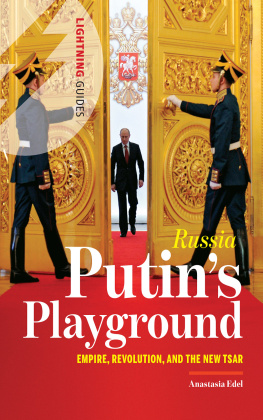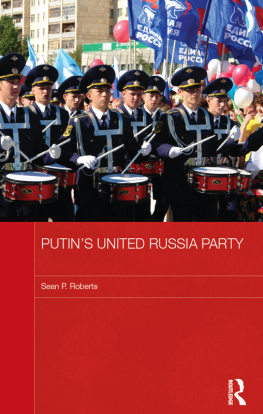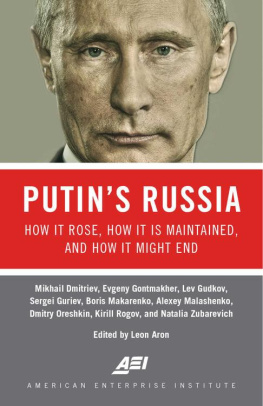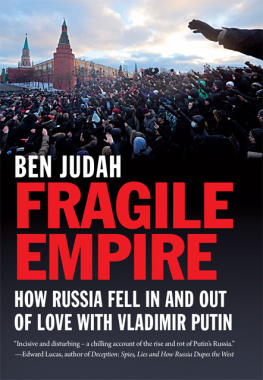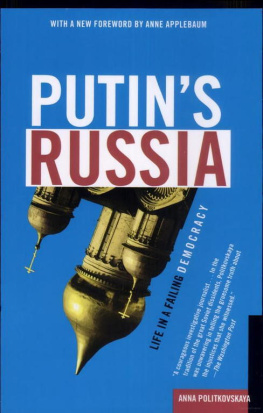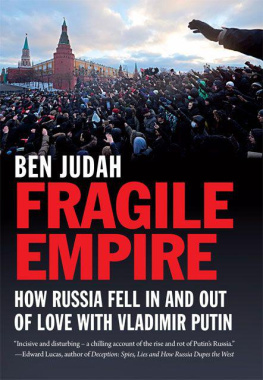Business Culture in Putins Russia
This book examines how Russias entrepreneurs operate in a business environment beset with risk and uncertainty. The challenges they may encounter include an unreliable judicial system, insecure property rights, arbitrary interference from officials, as well as corruption, harassment, suspicion and violence. Based on extensive original research, including fieldwork within three businesses, this book explores how entrepreneurs survive and some thrive. It focuses on the kind of obstacles they face from day to day, details their motivations, rationale and methods, and describes the actual relationship between ordinary entrepreneurs and the state, providing new insights into businessstate relations.
John Kennedy completed his doctorate at the University of Birmingham.
BASEES/Routledge Series on Russian and East European Studies
For a full list of available titles please visit: https://www.routledge.com/BASEES-Routledge-Series-on-Russian-and-East-European-Studies/book-series/BASEES
Series editors:
Sociology and Anthropology: Judith Pallot (President of BASEES and Chair), University of Oxford
Economics and Business: Richard Connolly, University of Birmingham
Media and Cultural Studies: Birgit Beumers, University of Aberystwyth
Politics and International Relations: Andrew Wilson, School of Slavonic and East European Studies, University College London
History: Matt Rendle, University of Exeter
This series is published on behalf of BASEES (the British Association for Slavonic and East European Studies). The series comprises original, high-quality, research-level work by both new and established scholars on all aspects of Russian, Soviet, post-Soviet and East European Studies in humanities and social science subjects.
Governing the Soviet Unions National Republics
The second secretaries of the communist party
Saulius Grybkauskas
Putins Fascists
Russkii Obraz and the politics of managed Nationalism in Russia
Robert Horvath
Building Communism and Policing Deviance in the Soviet Union
Residential childcare, 19581991
Mirjam Galley
Translating Great Russian Literature
The Penguin Russian classics
Cathy McAteer
Labour, Mobility and Informal Practices in Russia, Central Asia and Eastern Europe
Power, institutions and mobile actors in transnational space
Edited by Rano Turaeva and Rustamjon Urinboyev
Business Culture in Putins Russia
John Kennedy
The Donbas Conflict in Ukraine
Elites, protest, and partition
Daria Platonova
Business Culture in Putins Russia
John Kennedy
First published 2022
by Routledge
2 Park Square, Milton Park, Abingdon, Oxon OX14 4RN
and by Routledge
605 Third Avenue, New York, NY 10158
Routledge is an imprint of the Taylor & Francis Group, an informa business
2022 John Kennedy
The right of John Kennedy to be identified as author of this work has been asserted by him in accordance with sections 77 and 78 of the Copyright, Designs and Patents Act 1988.
All rights reserved. No part of this book may be reprinted or reproduced or utilised in any form or by any electronic, mechanical, or other means, now known or hereafter invented, including photocopying and recording, or in any information storage or retrieval system, without permission in writing from the publishers.
Trademark notice: Product or corporate names may be trademarks or registered trademarks, and are used only for identification and explanation without intent to infringe.
British Library Cataloguing-in-Publication Data
A catalogue record for this book is available from the British Library
Library of Congress Cataloging-in-Publication Data
A catalog record has been requested for this book
ISBN: 978-1-138-60308-0 (hbk)
ISBN: 978-1-032-10078-4 (pbk)
ISBN: 978-0-429-46917-6 (ebk)
DOI: 10.4324/9780429469176
Typeset in Times New Roman
by SPi Technologies India Pvt Ltd (Straive)
Preface
This book is about contemporary Russian business culture. In Russia, where the state has been the dominant force in the economy throughout history (Connolly 2020: 6), conditions for private enterprise have always been challenging and property rights weak, while in the popular imagination biznes (business) is still as much associated with crime and corruption as it is with legitimate enterprise. To an extent, the story of contemporary Russian business is the story of post-Soviet Russia itself: those with political connections have done well while the rest find their way by hook or by crook. In my encounters, Russian entrepreneurs frequently reverted to humour or an ironic expression when I raised the subject of Russkii biznes (Russian business): Havent you heard about our police? replied one with a wry smile; another had personalised his car registration plate to combine the word thief (vor) with the phone number of the local police department. While such responses are ironic, they are also grounded in hard fact: although President Putins governments have spent 20 years talking up the need for business development and entrepreneurs rights, he himself has often contradicted that message, most recently drawing associations between business people and swindlers (2020: online). These remarks reveal the basic fact that, despite a number of formal initiatives to support business, in practical terms the Kremlin has created a specific form of capitalism characterised by a predatory, interventionist state. Under these conditions, why would any Russian become an entrepreneur, and how would they survive in business? These are the questions I explore in this book.
In my view, study of the relationship between the strong state and weak private sector (save for a set of state-affiliated enterprises and their patrons) is an essential tool for interpreting the Kremlins decision making in domestic and international affairs. However, this is not a book about whether government policy could be improved to support business development better, because it is evident in research, press coverage and popular culture (and Putins remark above) that independent businesses operate in a commercial environment beset with risk and uncertainty. Indeed, I will argue that a weak business class is a feature of the political economy President Putins government has created rather than a problem it is working actively to solve. Instead, I focus on how entrepreneurs respond to these conditions, what it is like to be an entrepreneur under these circumstances and why they bother in the first place. In sum, I aim to offer a sense of contemporary Russian business culture among entrepreneurs operating in the real economy.
I approach these questions through an investigation of business practice based on observation of commercial life within three Siberian companies. As I reason, doing business in Moscow and St Petersburg is not the same as that undertaken in the majority of the country, while too few Western studies have focused on life in Russias regions. While I draw in evidence from across Russia as a whole, I hope this study offers specialists and general readers a greater sense of contemporary life in the countrys regions. As I find, all my informants resent the risks, challenges and vulnerabilities they encounter and which I describe in detail, but they have also developed capabilities to survive or thrive in spite of these obstacles. In my interpretation, their capacity to survive is less a result of their commercial acumen than their understanding of what can be achieved in their particular circumstances; their knowledge that businessstate relations take an informal, personalised form; and their preparedness to resist predatory outsiders.



